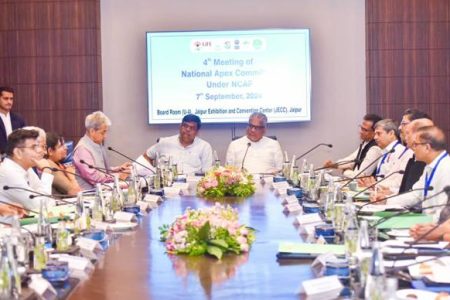Jaipur: Union Environment Minister Bhupender Yadav chaired the 4th meeting of the Apex Committee of the National Clean Air Programme (NCAP) in Jaipur on the occasion of Swachh Vayu Diwas, also known as the International Day of Clean Air for Blue Skies. The meeting focused on reviewing the progress of clean air initiatives across 24 states and 131 cities. State Minister of Environment and Climate Change, Rajasthan, Sanjay Sharma, was also present at the event.
During the meeting, Minister Yadav provided an update on the performance-based grants under the NCAP, which have allocated Rs. 19,612 crore to 131 cities for implementing clean air action plans from 2019-2026. Out of this, Rs. 11,211 crore has already been disbursed to achieve the target of reducing PM10 levels by 40% or bringing them in line with the National Ambient Air Quality Standards (NAAQS) by 2025-26. The Minister highlighted key initiatives aimed at reducing pollution from road dust, vehicular emissions, waste management, greening urban areas, and controlling industrial pollution.
Yadav also emphasized the creation of 3,776 hectares of Nagar Van (urban forests) in 64 cities under the Nagar Van Yojana with a sanctioned budget of Rs. 142 crore. He encouraged other cities to utilize available resources for developing green spaces, congratulating nine cities for their performance under the Swachh Vayu Sarvekshan for effectively reducing air pollution.
The Minister noted that air quality improvements have been recorded in 95 cities, with 18 meeting NAAQS for PM10 levels in 2023-24. He commended the achievements of 51 cities that reduced PM10 levels by 20% and 21 cities that achieved the 40% reduction target.
Highlighting Prime Minister Narendra Modi’s global tree-planting initiative Ek Ped Maa Ke Naam, Yadav praised the extensive tree plantation drives conducted in 131 cities. He also discussed the establishment of a Coordinating Mechanism to address transboundary air pollution in the Indo-Gangetic Plain (IGP) region, which involves eight states and Union Territories.
Yadav called for cities to update their clean air action plans and focus on 100% saturation of Mission LiFE (Lifestyle for Environment) actions. He urged reforms in waste management, including solid, plastic, and e-waste, as well as addressing vehicular pollution and raising public awareness to achieve cleaner air.
Various Union Ministries presented their contributions to the NCAP’s success during the meeting. The Ministry of Housing and Urban Affairs highlighted initiatives like the Swachh Bharat Mission 2.0, Smart City Mission, AMRUT, and PM e-bus Sewa, which address urban mobility, waste processing, and the development of green spaces.
The Ministry of Petroleum and Natural Gas reported on the expansion of CNG stations under the city gas distribution network, along with efforts to produce CNG from biomass under the SATAT Scheme. The Ministry of Road Transport and Highways discussed the implementation of the vehicle scrapping policy, aimed at phasing out old vehicles and reducing pollution.
Representatives from top-performing cities, including Surat, Firozabad, and Raebareli, shared success stories of their clean air strategies during the meeting.

